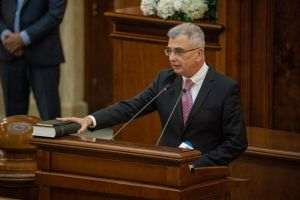2004 is an important year in the post-communist history of Romania for it is the year when the economy should take a decisive turn. Of course, had this turn been taken sooner, before 2004, things would have been better. But this is the way things happened in Romania.
What makes 2004 a special year? The fact that, much like at a crossroads, the year 2004 is a point where several trains of events meet; events that have been developing, if not parallel, at least autonomously to a high degree. Sometimes even in contradiction to some of the rules generally accepted in the developed economies.
First of all, 2004 is the year when the much-desired macro-economic stability is accomplished. There were other periods of deflation before, after 1991, but they were never so long and so fruitful as the one that started in the year 2000. Ever since the year 2000, the conjugated policies of The National Bank and The Government have been producing firm and continuous deflation, an almost incredibly low budget deficit, a bearable current account deficit (event if it is high and getting higher) and a reasonable exchange rate. As far as the latter aspect is concerned, The National Bank even implemented a policy of strengthening the ROL, which has gained a little on the USD and EUR lately. If to all this we add The National Bank's forex reserves, which are now higher than ever, then we can understand The National Bank's optimism, expressed by the intention to denominate the ROL as a manner of announcing the end of inflation.
Second of all, 2004 is the year when privatization is practically completed. After the oil and gas companies, the electricity distribution companies and The Romanian Commercial Bank will have been privatized, the only companies left in The Government's portfolio will be either impossible to sell or not worthy of the effort of trying to sell them. "The Big Give-Away" - the transfer of the huge Socialist wealth to private property - is over. Only crumbs are left. From now on, whatever kind of economy is going to be built in Romania, "functional' market economy or "not-so-functional, it will be an economy built on private property.
Moreover, it will be a strongly integrated economy, especially in the European economy. Romania's integration into The European Union is a process that is not complete yet, but the transformations that the Romanian economy has undergone as a result of this process are so significant that our economy is already closer linked to the European economy that it once was to the COMECON economies.
Third of all, 2004 is the fifth consecutive year of sustainable economic growth. The average growth rate is almost five percent, which is not exactly a record, but this five-year consistency has built confidence in the Romanian economy. The best argument in this respect is the rapid expansion of private consumer credit. It is true that the interest rates and commissions that Romanians are paying on consumer loans are still far higher than in the developed world, but the fact that the large private banks have started betting on Romanian wages proves their confidence that these people are not running a significant risk of losing their job in the near future, or suffer an unexpected cut in their purchasing power caused by a possible devaluation of the ROL that might render them unable to pay back their loan.
Last but definitely not least, the much-expected restructuring of the Romanian economy has taken place. The industry seems to have "shaken off' more or less all the unviable parts. The many carcasses of steel mills, machine building factories and so on are standing testimony to this restructuring. And what has survived so far - the apparel and footwear industry, some of the machine building industry and some of the steel industry - has good chances of further survival. It is true that not much has changed as far as agriculture is concerned and it is also true that Romania is somewhere outside the new market economy, but, on the other hand, we do have a new, very dynamic and very "happening' industry: IT&C. At the same time, the financial system seems to have made a full recovery after being almost entirely taken over by foreign capital. The long chain of bankruptcies among Romanian-owned banks, insurance companies and investment funds, established rather to defraud their customers than to do legitimate business, is over.
If to all this we add the additional security extended to investments in Romania by the country's accession to N.A.T.O. and the forthcoming E.U. accession in 2007, we can see why 2004 is a very special year in the history of Romania. It is the year when we are about to end transition.
Well, we've done it! Now what?
This is a question that no one rushes to answer, as if all of us, politicians, businesspeople or common citizens, have come to feel so great about our long transition that we refuse to think about what to do when transition is finally over. But we still need to do something. To think something up and plan it because stalling transition and groping about one of the possible ways to go can do nothing but prolong the risks of transition.
What are we going to do about the rural environment and the three million people who are uselessly working in agriculture (if we had a labor productivity rate similar to the developed countries we would do with only a few hundred thousand agricultural workers)? Which industries should we develop? Which industries should be turn in to the "engine' of sustainable development we talk so much about? In what are we going to invest The Government's money, our money, and the prospective foreign investors' money? What are we going to teach in our schools so that we can be sure that it will be useful to the future workers, engineers, economists etc? In brief, what and how are we going to develop from now on? What are we going to focus our efforts on? Especially considering that the notorious "national development strategy' expiring in 2005 is already insufficient...
These are questions we need to answer fast, first the intellectuals and then the politicians, despite the fact that 2004 is also an electoral year.

















































